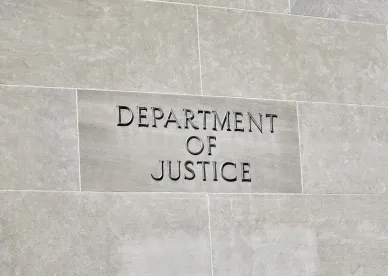On Oct. 28, 2021, Deputy Attorney General Lisa Monaco announced that the Department of Justice (DOJ) was instituting certain changes to its policy on prosecuting corporate entities. It is unclear what these changes, which are discussed below, will mean in practice, but they signal that the DOJ is focused on corporate criminal liability and individual accountability. DOJ investigations will continue to be extensive, and companies should consider having in place a robust compliance program in the event of a government inquiry and enforcement action.
The DOJ policy changes were announced in remarks made by Deputy Attorney General Monaco to the 2021 ABA White Collar Conference and accompanied by a written memorandum to all DOJ employees. According to the written memorandum:
-
In considering how to resolve an investigation, the DOJ will “consider a corporation’s entire criminal history.”
-
To receive cooperation credit, a corporation must “provide all information concerning all persons involved in corporate misconduct.”
-
Consideration of “monitors” will be the practice, as opposed to the exception, in corporate resolutions.
First, with regard to the DOJ’s consideration of a corporation’s history of misconduct, the memorandum directs that prosecutors must consider all “misconduct by the corporation discovered during any prior domestic or foreign criminal, civil, or regulatory enforcement actions against it, including any such actions against the target company’s parent, divisions, affiliates, subsidiaries, and other entities within the corporate family.” In her remarks, Deputy Attorney General Monaco explained further by noting that such prior misconduct “speaks directly to a company’s overall commitment to compliance programs and the appropriate culture to disincentive criminal activity.” Notably, the prior misconduct need not relate to the instant investigation or charges.
Second, concerning a company’s provision of information on individuals in corporate investigations, the memorandum is a return to prior DOJ policy. The memorandum states “that to qualify for any cooperation credit, corporations must provide to the Department all relevant facts relating to the individuals responsible for the misconduct,” reinstating that factor from former Deputy Attorney General Sally Yates’s 2015 Memorandum addressing “Individual Accountability for Corporate Wrongdoing.” In 2018, former Deputy Attorney General Rod Rosenstein had announced a revision to the 2015 guidance, focusing instead on those individuals that were “substantially involved” in misconduct. Now, according to the new memorandum and the deputy attorney general’s remarks, “companies cannot limit disclosure to those individuals believed to be only substantially involved in the criminal conduct,” but must identify “all individuals involved in or responsible for the misconduct at issue, regardless of their position, status, or seniority, and provide to the Department all nonprivileged information relating to that misconduct.”
Finally, in connection with the use of monitors, the new DOJ policy is that the “Department should favor the imposition of a monitor where there is a demonstrated need for, and clear benefit to be derived from, a monitorship.” Prior to this, and pursuant to 2018 Criminal Division guidance, monitors were viewed generally as the exception and not the rule. In her remarks, the deputy attorney general made clear this will no longer be the case and that the DOJ is “free to require the imposition of independent monitors whenever it is appropriate to do so in order to satisfy our prosecutors that a company is living up to its compliance and disclosure obligations under” a deferred prosecution agreement or non-prosecution agreement.
It will take some time to measure the effect these changes in DOJ policy will have. But there are some immediate considerations for practitioners and companies, as stated below.
Key Takeaways
-
Any internal investigation must account for these DOJ changes. A company should not only investigate wrongdoing thoroughly but also account for and identify prior misconduct of the company—and its related entities—as that prior misconduct will now affect any potential DOJ resolution.
-
Companies need to ferret out all instances of individual misconduct and understand each individual’s role in the conduct at issue.
-
To mitigate the risk of monitor imposition, companies may wish to focus not only on remediating past misconduct but also—pursuant to Deputy Attorney General Monaco’s new memorandum—on demonstrating to DOJ that the company’s compliance program is “tested, effective, adequately resourced, and fully implemented at the time of resolution.” As in the past, the thoroughness of an internal investigation, and the maintenance of credibility and trust with the DOJ during the investigation, could have a substantial impact on whether a monitor is required.







 />i
/>i
